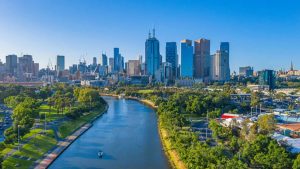Delhi produces nearly 700 tonnes of plastic every day – which is 5 times as heavy as a Blue whale – of which only 60% is recycled, the rest is thrown into landfills.
Delhi, the capital of India, is the 5th most polluted city in the world in terms of air quality. The pollution in the city is aggravating due to increasing population, urbanisation, changing lifestyles and consumption patterns of the 30 million people living in Delhi.
Some of the major issues faced by the city are of Air pollution and Solid waste management.
DILEMMA OF SOLID WASTE MANAGEMENT
Over 9500 tonnes per day (TPD) of garbage is generated in Delhi. About 8000 TPD of waste is disposed of in the three landfill sites at Bhalswa, Okhla and Ghazipur. This has led to a rapid increase in the size of garbage mountains in Delhi, particularly in Ghazipur.
The garbage mountain at the Ghazipur landfill is expected to rise higher than the Taj Mahal next year.
The three landfill sites are not designed as per specifications mentioned in Solid Waste Management Rules, 2016. Appallingly, according to the Master plan for Delhi 2021, these landfill sites had exceeded their capacity way back in 2008.
As per the latest draft manual on municipal solid waste management, 3 million tonnes of waste can be accommodated on 40 ha of land (assuming, the life of a landfill is 20 years).
Delhi needs 800 ha of land, which would cost Rs 80,000 crore (800 billion rupees) going by the present circle rate!
But the city simply does not have the land.
Every tonne of waste disposed of at a landfill would cost the Municipal Corporation of Delhi about Rs 14,500 – for 8000 TPD, it adds up to Rs 116 million – a sum that is highly unsustainable.
Landfills are clearly not the answer.
EXTREME DETERIORATION OF AIR QUALITY
Air quality in Delhi is degrading at an alarming pace. The main causes for this include,
- Burning petroleum products like diesel and petrol
- Coal combustion
- Biomass burning
- Industries
- Dust deposits
Out of these cases, the role of waste management systems contributing to air pollution in Delhi can not be neglected.
Approximately, half of the gas emitted from landfills is methane and carbon dioxide which are well-recognised Greenhouse gases, adding to the air quality woes in Delhi.
Incineration of this waste, as an alternative, is more damaging to the ecosystem as a result of its emissions. It is crucial to note here that the incinerator emits more carbon dioxide per MW/hour than any fossil fuel-based power source, including coal power plants.
Four kinds of waste find its way to the 3 ‘waste to energy’ plants located in Delhi. These are:
- Plastic waste
- Electronic waste
- Biomedical waste
- Construction waste
INITIATIVES TAKEN
- AUTHORITY
- In 2016, the National Green Tribunal (NGT) directed all states and Union Territories to submit their action plan related to the management and disposal of waste in the state.
- As per the judgement, the plan was to be in accordance with the principles of the circular economy.
- That, in effect, made it mandatory for the power generation and cement plants within its jurisdiction to buy and use Refuse-Derived Fuel (RDF) as fuel in their respective plants, wherever such plant is located within a 100 km radius of the facility.
- In July 2019, the NGT sought compliance from Delhi government with the Tribunal’s 2018 order to deposit Rs 25 crore with the Central Pollution Control Board (CPCB) for unregulated handling of plastic.
- COMMUNITY
- SCRAPPED, an initiative in three areas of Delhi’s Rohini sub-city, has piloted projects for source segregation of waste, door-to-door collection, composting kitchen waste and dry waste collection.
- Green Crusaders, a self-sustaining initiative by the women in Noida, has been working at managing household waste, since August 2018.
The group receive 600-700 kilogram waste (wet and dry) from 1,000 households a day and produce approximately 60 kg compost, which is sold at Rs 10 per kg; compost leachate, used as liquid fertiliser, is bottled and marketed at Rs 50 a litre within the locality.
All this has resulted in community participation, organised set-up of waste segregation, collection and recycling.
CSR INTERVENTIONS
- Pidilite Industries Ltd collected 531.40 Metric ton (MT) of plastic waste and 296.40 MT of multi-layered plastic and recycled waste generated out of packaging plastic through authorised recyclers in 2018-19.
The company co-processes hazardous waste, i.e use it as raw material to replace fossil fuels (coal, petroleum) in order to generate energy, to use it as a fuel in cement industry, wherever permitted by regulations.
- New Delhi – Tech Mahindra Ltd sent over 209 ton of E-waste for recycling in 2018-19 through an authorised vendor and encourages associates to avoid single-use of plastic and use eco-friendly products.
The company Implements the process of reduce, reuse, recycle and recover across the value chain to decrease plastic waste, and has a robust waste management system of segregation at source, collection and management of both hazardous and non-hazardous waste.
CIRCULAR ECONOMY SOLUTION
AUTHORITIES
With an advancement of technology, the following processes have the potential to overcome these challenges
- Biomethanation is a process in which organic material is converted into biogas, by the action of microbes under anaerobic conditions.
- Conversion to refuse-derived fuel; Refuse derived fuel is the product from separating the non-combustible materials from the combustibles, so they can be used as non-fossil fuel to produce energy for facilities like cement kilns and power plants.
Converting waste to power generation is a feasible and productive solution.
In a successful model of waste management in Panjim, the municipal corporation not only ensures segregation at the source but also segregates dry waste into 30 different categories.
Formalising of source-level segregation and composting can create a drastic change in waste management.
CITIZENS
- With the majority of biodegradable waste, there is high potential to compost or generate biogas out of the segregated wet waste.
- Thus, segregation at source is the primary step.
- The Alappuzha Model in Kerala is the best model in the country on decentralised waste management. The residents have taken upon themselves to segregate and treat the waste at source.
It is recognised by the United Nations Environment Programme (UNEP) amongst five cities in the world that are working towards curbing pollution through their sustainable solid waste management practices
- Awareness among communities is an essential step towards closing the loop in waste management.
- The practice of Reuse, Reduce, Refuse and Recycle must be taken up by the citizens in order to manage waste.
EARTH5R TRAINING AND CIRCULAR ECONOMY DEVELOPMENT PROJECTS
Clean-up Drives and Waste Management
Earth5R, along with students and citizens have conducted many cleanliness drives in Delhi.
- At India Gate, the Earth5R team collected plastic bottles, food wrappers, polyethene bags as part of a clean-up.
- At Connaught Place, the team collected bags full of plastic bags, disposables, used cigarettes, broken glass bottles, food wrappers and much more thrown over the streets.
- During the Yamuna river clean-up, the team was able to collect about 2-3 full bags of plastic and other rubbish from just that small area in the vicinity.
- The waste which is collected is given to the ragpickers so that not only will the waste be recycled, but it would also generate revenue for the ragpickers.
- The idea of recycling or upcycling items after its use is the sustainable model that Earth5R is striving to integrate into many communities across India.
ABOUT EARTH5R
Earth5R is an environmental organization from India with its head office at Mumbai. It works with the NGO sector, Companies and helps them conduct environmental corporate social responsibility (CSR) programs across India. Earth5R specializes in circular economy based projects. Earth5R also offers short term and long term environmental courses.
Earth5R is conducting large-scale online training on COVID 19 Coronavirus prevention, response, management, and self-sustainability. These training are conducted on digital platforms in regional languages across India and other countries.
Earth5R’s Global Sustainability Hub is a cross-sector and cross-country collaboration in pursuit of UN Sustainable Development Goals. It is an excellent opportunity for governments and the private sector to engage with communities, use Sustainability-based models to drive economic changes and create social and environmental impact.
Reported by Aastha Dewan, edited by Riya Dani




